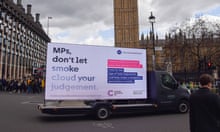Rishi Sunak is considering introducing some of the world’s toughest anti-smoking measures that would in effect ban the next generation from ever being able to buy cigarettes, the Guardian has learned.
Whitehall sources said the prime minister was looking at measures similar to those brought in by New Zealand last December. They involved steadily increasing the legal smoking age so tobacco would end up never being sold to anyone born on or after 1 January 2009.
It is understood Sunak’s leadership pledge to fine people £10 for missing a GP or hospital appointment may also be back on the table, although this could be politically difficult. The idea was announced by the prime minister during his campaign in summer 2022, but appeared to have been dropped when he took office last autumn.
A New Zealand-style anti-smoking policy would mean cigarettes would be phased out completely for the next generation. Under the former prime minister Jacinda Ardern, New Zealand also legislated to reduce the nicotine content of tobacco products and force them to be sold only through specialty tobacco stores, rather than convenience stores and supermarkets.
Labour has previously said it was consulting on phasing out cigarette sales over time for younger people in a similar way to New Zealand, with the shadow health secretary, Wes Streeting, saying in January he wanted to find out whether there was an “appetite for change” in the country.
The policies under consideration are part of a new consumer-focused drive from Sunak’s team before next year’s election. This week the prime minister was widely criticised by business, centrist Tories and environmental groups for rowing back on his own party’s net zero targets.
He was also accused of sowing uncertainty in education after it emerged he was considering an overhaul of A-levels to move to a system more similar to the international baccalaureate, which allows students to study more subjects.
In relation to Sunak’s net zero rowback and confusion over his education policies, Keir Starmer, the Labour leader, said the government was creating instability in the country that was exacerbating an “economic bin-fire” under the Tories.
“At a time when people and businesses are crying out for stability, Rishi Sunak has poured fuel on the Tories’ economic bin-fire in a desperate bid to keep Liz Truss and her fellow arsonists happy,” he told the Guardian.
“Britain has a once in a generation chance to reverse 13 years of decline and get ahead – to bring down people’s bills, create quality jobs and free us from the grip of Putin and over-reliance on China. Rishi Sunak’s weakness now stands between the country and proper national renewal.”
Sunak is also under pressure over the HS2 high-speed rail line, with talks being held over whether to cut the Birmingham to Manchester arm of the project in a move that would infuriate northern Tories and further risk seats won under Boris Johnson in 2019.
The prime minister is understood to be considering whether some infrastructure spending needs to be “reprioritised”, and cancelling the northern leg would potentially free up billions for the chancellor to use for pre-election tax cuts. The chancellor, Jeremy Hunt, said this week that the costs of HS2 were “totally out of control”.
No 10 and the Treasury are also considering policies on law and order, and the possibility of holding down further benefit rises – both of which they hope Labour might oppose in order to have clearer dividing lines at the election.
Downing Street insiders suggest Sunak has decided to pursue the policies that most matter to him under a “let Rishi be Rishi” approach. However, the shift in the net zero agenda, drawn up under the guidance of the electoral strategist Isaac Levido, as well as the search for dividing lines in the areas of welfare and crime, suggest the policy changes are also highly political.
Sunak’s autumn reset is likely to continue during conference season and the king’s speech in November, with the party casting round for policies that could reverse its weakness in the polls.
A YouGov poll found on Friday that the prime minister’s net favourability rating fell to -45, his lowest score to date, after the net zero changes were announced. It found 68% of Britons have an unfavourable view of the prime minister.
Separately, polling from Ipsos found the public were split over Sunak’s policy of a delay to net zero targets. It found that, of those who knew something about the policy, 47% felt the government was right, and 46% that it was wrong. About 71% of 2019 Conservative voters who were polled and aware of the announcement said it was the right decision, compared with 24% of 2019 Labour voters.
Asked about the policy of a New Zealand style-smoking ban, a government spokesperson said: “Smoking is a deadly habit – it kills tens of thousands of people each year and places a huge burden on the NHS and the economy.
“We want to encourage more people to quit and meet our ambition to be smoke-free by 2030, which is why we have already taken steps to reduce smoking rates. This includes providing 1 million smokers in England with free vape kits via our world-first ‘swap to stop’ scheme, launching a voucher scheme to incentivise pregnant women to quit, and consulting on mandatory cigarette pack inserts.”









